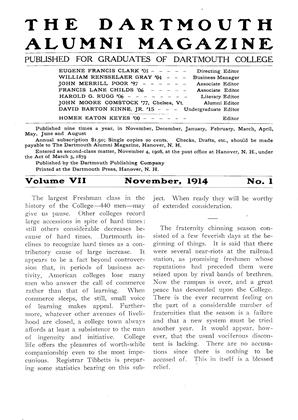(Cambridge, Printed at the Riverside Press, 1914)
To Dartmouth men of the last decade, this little green-bound volume of verse brings vivid memories of the strong, wholesome youth, whose undergraduate days were marked alike by his love of life and his love of letters. Here are gathered the lyrics Harry Blythe first published in the pages of The Dartmouth Literary Magazine, and the songs he used to read to his friends in his own room, as well as the stronger poems of his later years. Some are manifestly imperfect; many show the marks of the workshop; few probably have received all the polishing touches which the author, had he lived, would have given them. The reader must, therefore, put in abeyance his absolute standards of criticism, and read in that spirit of kindly understanding which alone can bring out the full significance of these verses, — verses which were to have been but preparatory exercises to the larger work that Blythe held before him as a dear ambition.
The poems are divided into five classes. The first, poems of Modern Life, contains the author's maturest work and shows a sympathetic appreciation and interpretation of the world of today. Here are sung the swiftness and power of modern machinery, the sordidness and the glory of labor, the strength and virility of great men, the hope of peace and the dread of war. The first in the group, A Railroad Yardat Night, is perhaps the finest poem in the whole volume. The second division, Poems of Love and Sentiment, is made up largely of undergraduate verse, and contains much that rings familiarly to the ears of men who read The LiteraryMagazine from 1904 to 1907. Boyish enthusiasm rather than manly insight characterizes the greater number of these verses; yet here is to be found at least one lyric, Forget-Me-Nots, which by its melody makes strong appeal. The group of Spiritual and Religious Poems touches deeper subjects than do the preceding divisions and shows a calm, certain, never-flagging faith in things eternal. The Descriptive Poems range from light verses on spring weather to sonorous praises of sea and mountain.
The final group, Dartmouth Poems, is that of most interest to the readers of THE MAGAZINE. The technique here displayed is, it is true, less sure than that in the other divisions; this is natural, for most of these poems were thrown off at top speed, under the impelling inspiration of some happy occasion. The best of the lot is, of course, the Class Poem, read at Class Day, 1907. But here, also, mingled with rollicking football songs and plaintive verses of retrospect, are the two dignified Inauguration Sonnets and the quiet quatrains of The Peace of College.
In general, Blythe's work shows that immaturity which is to be expected. Lines which echo unmistakably definite poets of older days are frequent; youthful and untested dicta on the problems of human life underlie much of the verse; and triteness and awkwardness of phraseology appear here and there. The. metre, on the other hand, is always pure; whatever else he may have failed to attain, the gift of melody he assuredly had. His facile handling of the sonnet — almost one-third of the poems are written in this form — is quite unusual in an author so young as Blythe. The busy world will pass by this little book unheeding, and justly so; for it has slight message for men at large. To those, 'however, who knew Blythe in his college days and later, it will stand as his most fitting memorial.
 View Full Issue
View Full Issue
More From This Issue
-
 Article
ArticleADDRESS DELIVERED AT THE FUNERAL OF JUDGE CROSS OCTOBER 5, 1914
November 1914 By Ernest Fox Nichols -
 Article
ArticleADDRESS DELIVERED AT THE OPENING OF COLLEGE – SEPTEMBER 24, 1914
November 1914 By Ernest Fox Nichols -
 Class Notes
Class NotesLOCAL ASSOCIATIONS
November 1914 -
 Class Notes
Class NotesCLASS OF 1841
November 1914 -
 Article
ArticleA NATION-WIDE DARTMOUTH NIGHT
November 1914 -
 Article
ArticleThe largest Freshman class in the history of the College
November 1914








